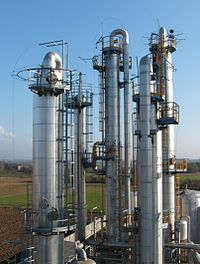
Photo from wikipedia
Temperature fluctuations seriously damage the performance of resonant accelerometers. Two approaches have been proposed in this paper to address this problem. In structural design, an electrostatic softening spring is utilized… Click to show full abstract
Temperature fluctuations seriously damage the performance of resonant accelerometers. Two approaches have been proposed in this paper to address this problem. In structural design, an electrostatic softening spring is utilized to modulate the external acceleration on the frequency of resonator’s anti-phase modal without any stress transmission and thus improve the thermal robustness of the accelerometer. In control circuit, a continuous ring-down technique is employed for real-time quality factor (utilized as a virtual thermometer) monitoring, which attenuates measuring hysteresis and improves the precision of temperature compensation. A prototype is implemented to verify the proposed approaches. Experiments show that this accelerometer is insensitive to stress and has better performance of temperature compared with the vibration beam resonant accelerometer. The bias stability of acceleration output was improved from 35.2 to 0.08 mg with real-time quality factor compensation ranging from −40 °C to +40 °C.
Journal Title: IEEE Sensors Journal
Year Published: 2018
Link to full text (if available)
Share on Social Media: Sign Up to like & get
recommendations!